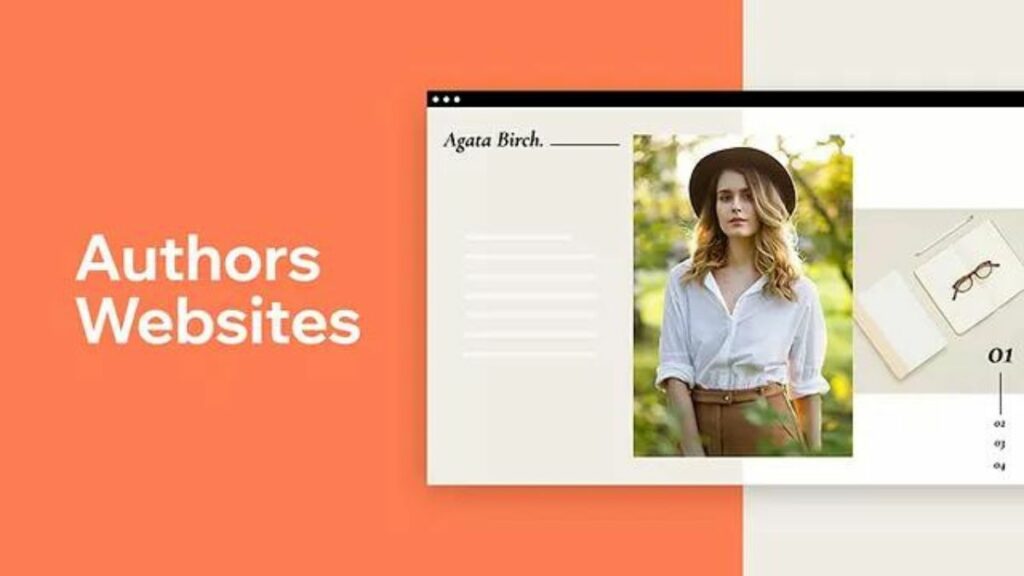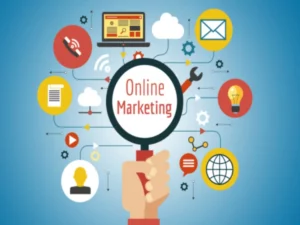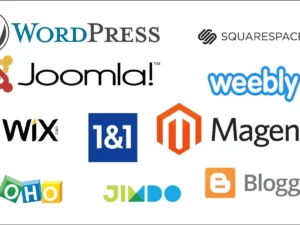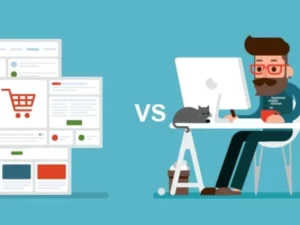Many authors, new or experienced, are now understanding the critical importance of a website for their career and business. A website allows readers to connect with you on a more personal level, find out more about your work and book appointments, or purchase your books directly from your site. Let’s discuss, in detail, the benefits and challenges of having an author-website.
What is an Author-Website?

An author-website is a personal website for an author to showcase their work, connect with readers (with content like blog, interviews, etc.), and have a unique space in the online world. It is a great way to promote and sell your books. Not only that, but an author-website comes with a host of other benefits, like hosting book giveaways, and more. Set up your website today, and you’ll be well on your way to increased book sales and a more successful author career.
Why do you need an author-website?
An author-website is a great way to promote your books, build your brand, and connect with readers. If you are a new or an experienced author, you need one. Although you may think that your Facebook, Twitter, and LinkedIn pages are enough. An author-website has many unique benefits that you cannot achieve from other platforms. First, it is you who owns the website. Social media or other platforms can ban you any day without notice or a valid reason. While your hosting provider can do the same. It happens rarely and only if the website does not follow the regulations or has offensive and criminal content. Also, it can help manage social media accounts, subscriptions to email lists/newsletters, memberships, and bookkeeping. In conclusion, an author-website becomes your official address in the online world.
What needs to be included on an author-website?
A website comprises four major components.
1. The landing page
It should have a design so that potential readers can easily find out more about you and your work. Include social media links, author photos, book covers, etc. It is basically the introduction page which talks about everything on your website. So it should be attractive, clear, and concise. Some times landing pages differ from the ‘Home page’. If you have a new book, you can design the landing page focussing on only the book.
2. The About/Bio Page
It is the page where you write about yourself. You should include a short bio or an introduction to your professional and personal achievements, if there are any. Also, you can include any personal stories about you if you think the readers may find it interesting.
3. The Products/Services Page
This is where you showcase your work. This is where your books, services, publications, etc. can go. Remember to make this page attractive and easy to read and navigate. Also, include all essential information such as genre, release date, etc. on the website!
4. The blog
It is where your readers can connect with you. This page is not mandatory but is essential if you want to make your website successful. Here’s an article for you explaining why you should write a blog. In short, on your blog, you can write articles that entice you and your readers. It connects you with your audience on an emotional level. You can also offer tips on writing and connect with other writers. Also, this page serves great use for making the website SEO friendly. It also updates your readers of your progress with the current project.
Apart from this, you can have as many pages and features as you like, which we will discuss later. But these are the essential pages without which your website will be incomplete.
The Benefits of Having an Author-Website

An author-website is essential for promoting your books and building your brand. Not only is it a great place to connect with readers. It can also be a great place to sell copies of your books. You can easily add multimedia elements such as book covers and author bios. Plus, many authors use their website as the primary source for promoting their work. Make sure you have a website that reflects your author persona and showcases your best work. By doing so, you’ll be on your way to building a successful author career! Here are some unique benefits of having an author-website.
Increased Exposure

Getting your book published is a long and arduous process, but a website is definitely worth it if you want to increase exposure. By having an author-website, you can easily keep track of your readers and foster relationships with them. In addition, author-websites are the official online address for you and are one of the best ways to market your book online. Your website is yours to customize, so you can build it in any way you want. You can create interactive videos, offer one-on-one sessions, or display brief paragraphs from your new book to gain exposure for your writing.
Easier Bookkeeping

One of the significant benefits of having an author-website is that it allows you to keep track of all your books, sales, and royalties. You can do it manually or through an author-website, which makes it easier for readers to find and buy your books. Having an author-website also provides other important features like blogging, social media presence, and more. By assembling all this valuable content in one place, you make promoting your book much simpler!
Increased Readership

Having an author-website has many benefits and is important for many reasons. Not only does it give you a platform to showcase your work, but it also enables you to connect with readers and sell your eBooks, merchandise, etc. Blogging will help you add to your fan list, the readers who have not read your book. Also, you can display brief paragraphs from your book on your website for readers to try your work and then purchase if they like it. You can also create online readers and offer books on your websites with a membership. In conclusion, you can use your website as an online reading store!
More Online Marketing Opportunities

There are several online marketing opportunities available to authors. By using an author-website, you can build a following of fans who will buy your books. Another great option is using your author-website as a distribution channel for your books—this means you get access to new markets that would otherwise be closed off because of publishing restrictions. Through effective online marketing, you can not only sell more books but also create long-term brand loyalty among readers. For example, you can offer freebies and collect emails, which will help you in building an email list that you can use for marketing your next book.
The Challenges of Having a Website

If you’re an author, having a website is essential. An author-website has several benefits. It can be a great way to promote your work, connect with fans, and even sell your books. However, there are many challenges associated with having a website. These can include cost, creation time, and lack of traffic. Make sure you have the right tools and strategies in place before starting, or you’ll likely fail. Here is a list of challenges that you must overcome about before starting.
Choosing the Right Platform

Builder Platform
Choosing the right platform is an important step in building a successful strategy. There are several to choose from, with each having its own unique set of features and capabilities.
The most popular platform for building and managing content for websites is WordPress. It offers a drag-and-drop editor platform but offers a range of features and customizations. You can install WordPress on any type of hosting for free (It is an open source resource, so offers any type of customizations) and chose from a variety of free and paid plugins to add features to your website. The scope is limitless and you can build a professional website within hours, but WordPress has some limitations, like adding too many plugins can make the website slow. Also, you are restricted to the features that the plugins offer if you cannot code. As a result, if you like to build a completely customized website, it is better to ask for help from a professional. However, for new writers, it is the perfect platform.
Read more on how to create a website on WordPress from scratch.
Another popular option is Wix, which is much simpler than WordPress and offers many themes and options and is used by many authors and bloggers, but it does not have the benefit of open source infinite plugins. Also, if you want to customize your theme, you have to know about coding. Other options include Squarespace, Weebly, Shopify, Drupal, Joomla, etc.
Hosting Platform
Another challenge while choosing a platform is what kind of hosting you want. If you plan to build a simple website that showcases your work and a good blog, shared hosting works good and is cost effective. However, if you plan to create a feature rich website with online purchasing, payment, integrated CRM, apps, etc, you will need a dedicated hosting. Of course, it will be a little heavy on the wallet, but it’s worth it as shared servers will kill the speed of your website, making it useless. If you have a new website that is light and has low traffic, you can even choose the free tiers on GCP, AWS, Oracle cloud, and Microsoft Azure, and as your website earns fame, you can pay as per the usage.
You need to make sure that the platform you select will help you achieve your goals and objectives. Choosing the wrong platform and switching later will cost you a lot of effort, and maybe even a lot of money. So do a little research on what you want and what is the right way to implement it.
DIY or Hiring a Pro

Managing a website on your own is great for independence and allows you to connect with potential readers personally. However, it’s important to make sure that the website looks professional and is easy to navigate. It’s helpful to use one of the many popular platforms like WordPress, Wix or Drupal, which are relatively affordable and will give you control over every aspect of your site design. WordPress and Wix are the platforms where you can build and maintain your author-website by yourself. However, Drupal, Joomla, and Magento require a learning curve, and if you are not comfortable with computers, most likely you will need the help of a professional. Also, if you want traffic influxes, then it might be necessary to invest in marketing efforts—something best left up to professionals who know what they’re doing!
In addition, keep in mind that maintaining a website is a tiresome work. First, you should know user interface design, font design, and other web related knowledge. Also, you might face coding errors or breakdowns while updating or adding a feature. Plus, a website requires regular monitoring and analysis to survive in the modern competitive world, so you would have to look at and interpret analytics and take actions. So it isn’t just a question of skills, you should also think about the time you would have to dedicate—Can you afford it alongside your writing? Think these points through and then go for what works best for you.
Monetizing Your Website Through Ads and Traffic Generation

Amongst the several benefits of an author-website, monetization is the most fun. There are many options available if you want to earn a few extra bucks. Paid ads are the most common way of doing this and can be run through platforms like Google Adsense or other similar programs. However, understand that an author-website is your personal space and would you like to spam your own website with ads? While you can use a bit of ads, if that is what you want, also consider monetizing through affiliate programs. After all, you are a writer—so write engaging articles and provide affiliate marketing links. This way you will keep a clean interface while earning with the purchases from your links.
Also, you can charge your readers for subscriptions and memberships. Remember that free giveaways, subscriptions, and memberships are a great way to gain traction amongst your readers. So divide your premium content with wisdom—some to collect emails and build loyalty, and some for earning a few extra bucks.
Finally, remember that while you will increase profits with various monetization methods, keeping your website healthy and compliant with search engine optimization regulations is important; or you might be banned from search engines or hosting providers.
Ensuring Quality Control

Content Quality
For your website, you need to have a content strategy in place that ensures all relevant and useful information; ensure website quality meets target audience’s expectations. Your website is your online identity and represents your skills, so it is important that you ensure accuracy in the content. The titles, descriptions, and prices should be correct; also, if you are writing blogs, you should fact-check them so that none of the information is wrong. One wrong information to the user and your loyal reader may never return to your website.
Second, you should also watch the type of content you are putting on your website. You should not write about topics that demean or display a negative outlook for a person or community. Although you may attract some users by writing about controversial topics or make a post go viral, remember that you are not aiming for an election. The primary goal is to sell as many books as possible—which is less effective with a divided user group.
Technical Quality
Third, you should also keep checking for any spam or offensive comments on your blogs, broken links, unresponsive pages, slow speed, etc., to deliver the best user experience possible. These factors may seem minimal, but in the long run, you will lose more readers than gain from promotion and marketing. Also, the efficiency of your website directly impacts your ranking on the search pages. So keep your website clean, healthy, and accurate.
Last, for every piece of writing, consider your website as important as your book. Remember, that it is a showcase of your skills and your readers will judge your book by the content on your website, so use good fonts and formatting; check for grammar and spelling mistakes; and keep your content engaging and easy to read.
Tips for Creating a Successful Website

An author-website has many benefits, but to reap all of them, you need to have a competitive, professional, efficient design. There are different ways to create a website, but creating a website that is successful is also essential and tricky. There is a lot of competition out there. So a user will return to your website only if it meets the standards and looks promising. If you keep the following tips in mind, you will create a website that will reflect your skills and you will stand out in the crowd.
Choose the right domain name
Choosing the right domain name for your website is an important first step. It needs to reflect the content and keywords you are targeting and complement the overall branding of your business. Once you have chosen a domain name, it’s time to build your website!
Create a coherent message and visual design
When designing a website, it is essential to ensure that your message is clear and well-communicated. Make use of high-quality visuals and make sure everything on the site is easy on the eyes. Keep your website updated so that visitors can find the latest information easily. In addition, consider using clickable headlines and plenty of social media widgets for easy sharing of important updates or blog posts.
Establish a business goal for your website
Website success relies on setting a business goal and making sure website content is coherent with this goal. Once you know your goals, display the content in a way that potential customers can’t help but visit it. Create pages and write articles that give a complete picture of your business goal. A user should not have to leave the website to find something related to your content.
Incorporate social media platforms into your plan
Social media platforms like Facebook, Twitter, and LinkedIn can be a great way to promote your work. However, make sure that the purpose of your website is to sell books! If not, you will end up promoting irrelevant information that has nothing to do with writing or selling. Apart from using these platforms for marketing, it’s also important to use social media platforms as an opportunity for author conversation and interaction. Answer questions people post about you on social media or blog comments. This will help build goodwill and enhance trust in readers towards your brand as an author.
Take advantage of search engine optimization
One of the most important benefits of having an author-website is you get to paint the internet with your personal brand. So website optimization for search engines is an important part of any online marketing strategy. Not only will good rankings on the first page of results help you generate more leads and customers. But it’s also a great way to educate potential consumers about your offering. Add keywords to titles, descriptions and images, as well as update content regularly. This’ll make sure that your website pops up in the search engine results pages (SERP). Besides this vital step, keeping track of social media platforms can also be fruitful in terms of SEO—since social media posts reflect website content directly!
How to Make Your Website Succeed

You have created your website, which is optimized and engaging. Now what? It is important to market your author-website to reap its benefits to the fullest. Here are a few tips that will help in the long run to make your website succeed.
Research your target audience
Before you even think of creating a website, it is important to first research your target audience. By doing so, your website will speak directly to them and appeal to their needs and interests. Once you have determined who are the most interested people, make sure that all of your content is top-notch quality. This way, potential customers will want more info about what you’re offering. In turn, they may decide to take the next step and purchase something from you. Also, research is an ongoing process as the wants of your readers will keep changing. So keep updating your website and keep generating new content for customer retention.
Choose the right design
There’s no doubt that an excellent design can make all the difference to attract attention to your website or blog. After all, it is the first thing people see when they arrive on your page. It should also be easy to navigate, packed with features, and should be engaging. In short, it should be so as not to lose readers after only a few seconds of reading. Ideally, the design should reflect your brand and message while also looking modern and fresh. Your website should reflect the type of writer you are, i.e. spiritual, fantasy, sci-fi, mystery, romance, etc. Also, high-quality graphics are essential for creating an impactful presence online. And last, don’t forget about the purpose of designing an excellent website or blog! It’s not just about making things look pretty; it’s about getting people interested in what you have to say!
Optimize your content for SEO
Optimizing your content for SEO is essential in order to improve website visibility and attract more traffic. This will help you measure the success of your efforts, which will allow you to prioritize the most effective strategies. Make sure all your content is high quality and keyword rich—this includes title tags, descriptions, images, etc. Research your keyword clusters and include all keywords in different posts. Also, look for long tail keywords and use social media platforms like Quora to answer questions and promote your website.
Promote your website
Promoting your website is an important part of content marketing. There are several ways you can do it, using social media buttons, book tags, etc. Remember, promoting on other platforms is possible even without a website. But you have one; and you can use it to achieve what is not possible on any other platform. For example, collecting emails from users. There are several ways you can do this, including offering giveaways or free memberships to exclusive content like courses. However, the best way to promote your website would be through careful design and enjoyable user experience. This will help ensure that people have a positive encounter with your site and end up buying your books or products!
Conclusion
Having an Author-Website is one of the best things you can do for your career as an author. Not only does it help you build a strong online presence, it also provides you with many benefits such as increased book sales, more book signings, increased social media followers, increased visibility in search engines, and more opportunities to connect with readers. So start today, remember to overcome the challenges, and reap the benefits of having your author-website.
More resources:
14 Tips to avoid failure while building an author-website.
Essential and optional elements of an author-website.
How to make your website look professional.


